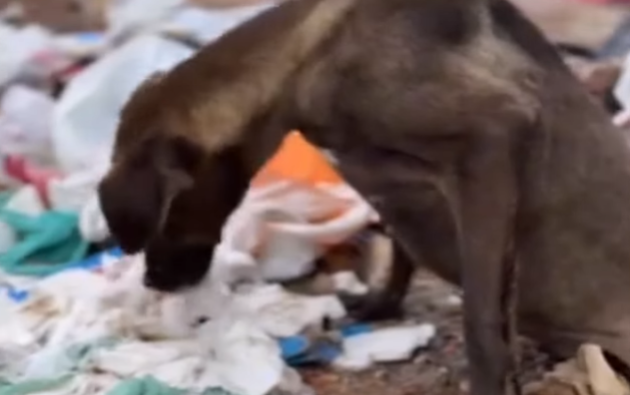
Rain had been falling steadily all morning, turning the city streets into slick rivers of gray. I had been driving to the shelter when I noticed him—a small, trembling dog lying by the curb, his legs twisted unnaturally beneath him. At first, I thought he had been abandoned, but as I got closer, I realized it was far worse. His hind legs were paralyzed, and he couldn’t even move them. He looked up at me with eyes so full of fear, confusion, and unspoken questions that my chest ached.
“Will I be okay?” those eyes seemed to ask.
I knelt beside him, careful not to startle him. The rain drenched us both, but I didn’t notice; all that mattered was that he needed me, and I had no choice but to respond. His body trembled violently, not just from the cold, but from the sheer terror of being helpless in the middle of a harsh, uncaring world. I wrapped a spare jacket around him and gently lifted him into my arms. Despite the weight of his small, fragile body, I felt the weight of responsibility too—the responsibility to keep him alive, to protect him, and to somehow assure him that everything would be okay.
The ride to the veterinarian was tense. I cradled him on my lap, his head resting against my chest, his eyes never leaving mine. Sometimes, he would whimper softly, and each sound was a stab to my heart. I stroked his ears, whispered soothing words, trying to convey all the love and safety I could in that moment.
At the clinic, the vet assessed him quickly. “He’s paralyzed from the waist down,” she said, her tone professional but grave. “We’ll do X-rays and tests to find out if it’s permanent or if there’s hope for recovery.”
I nodded numbly, not knowing how to respond. I felt both terrified and determined. Terrified that this sweet, trusting creature might never walk again, and determined to do everything in my power to give him a life worth living—even if it wasn’t the life he had imagined.
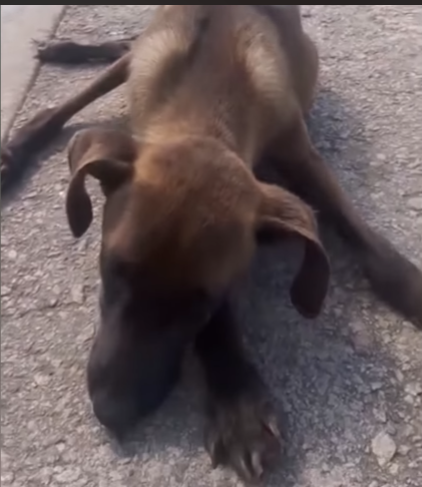
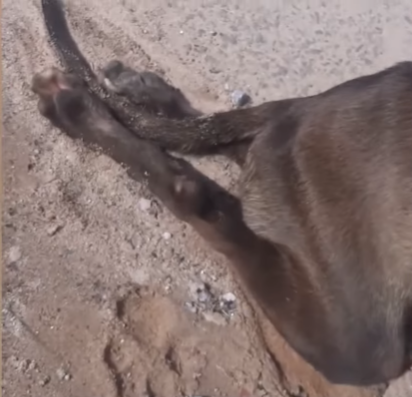
While the tests ran, I held him close. He rested his head against my shoulder, his warm, soft fur dampened by the rain. His eyes, still filled with that pleading question, gradually softened. For the first time, they seemed to ask not “Will I be okay?” but “Can I trust you?”
And in that moment, I knew the answer: yes. He could trust me. I wouldn’t leave him. I wouldn’t give up on him, no matter how long it took or how difficult it became.
The vet returned with news that was both sobering and cautiously hopeful. “There’s a chance of partial recovery,” she explained. “We’ll need to start physical therapy immediately and monitor his condition carefully. Surgery might be required, but for now, he needs rest, warmth, and care.”
I nodded again, swallowing the lump in my throat. There was hope, but it would be a long, uncertain road. And I knew that more than anything, he needed reassurance that he was not alone.
I brought him home, creating a small, safe space in my living room with blankets, pillows, and a soft bed. Every movement was careful; I lifted him gently, supported his fragile legs, and adjusted his position so he wouldn’t develop sores. The first night, he shivered despite the warmth, and I held him close, rocking him gently. His eyes met mine again, full of vulnerability and unspoken fears.
“Will I be okay?” he seemed to ask again.
I whispered to him, “You will. You’re safe. I’ll make sure of it.”
Exhausted from the day’s events and the fear still coursing through him, he slowly relaxed in my arms. His body grew heavy, and eventually, he drifted into a deep, trusting sleep, resting entirely in my care. I held him longer than I had intended, watching the rise and fall of his tiny chest, feeling a profound connection that went beyond words.
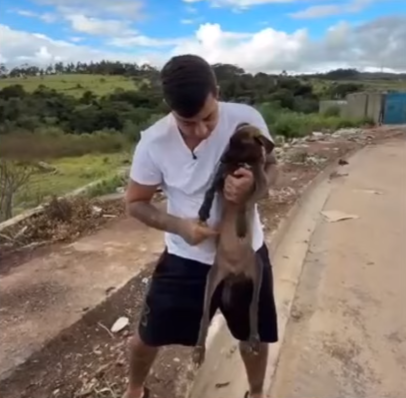
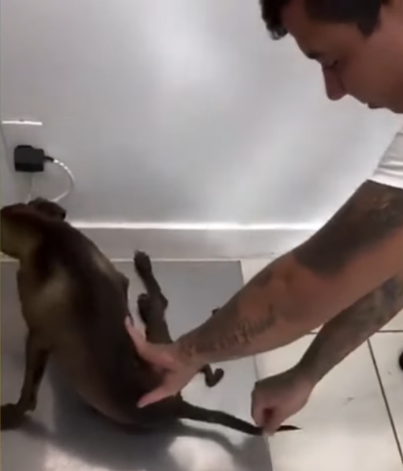
The following weeks were filled with a mixture of small victories and setbacks. Physical therapy sessions were grueling, both for him and for me, but every time he wagged his tail—even slightly—it was a reminder that life, despite its cruelties, could still bring joy. I learned to feed him in ways that encouraged movement, to massage his paralyzed limbs to prevent stiffness, and to provide comfort when he seemed frustrated by his limitations.
There were nights when he would look up at me, eyes wide and questioning, and I could feel his fear as if it were my own. “Will I be okay?” Those eyes never asked it out loud, but I answered silently every time with unwavering certainty: yes. He would be okay because we were in this together.
One particularly cold night, as the wind howled outside and rain lashed against the windows, he crawled into my lap, resting his head on my chest. He had struggled to move across the floor, dragging himself with determination, and now he finally gave in to exhaustion. I wrapped a blanket around him, stroking his fur, feeling the warmth of his trust. Slowly, his eyes closed, and he fell asleep again, this time without fear.
Watching him, I realized something profound: trust is fragile, yet it is also one of the most powerful forces in the world. He had been vulnerable, paralyzed, and afraid, yet he had chosen to trust me completely. And in return, I chose to be unwavering in my care, in my love, in my commitment to him. That unspoken bond became a lifeline for both of us.
Weeks turned into months. With therapy, patience, and love, he began to regain small movements in his legs. The tail wagged more confidently, his eyes sparkled with curiosity, and his once pleading gaze began to show quiet confidence. Each tiny progress felt monumental, not just for him, but for me. I had witnessed a journey from despair to hope, from helplessness to tentative strength, and it changed both of us.
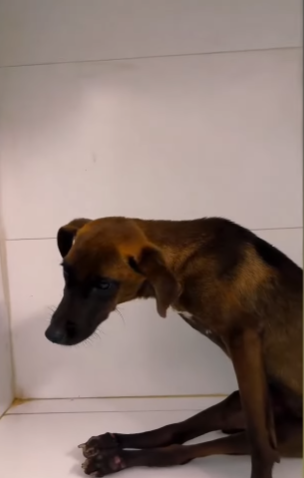
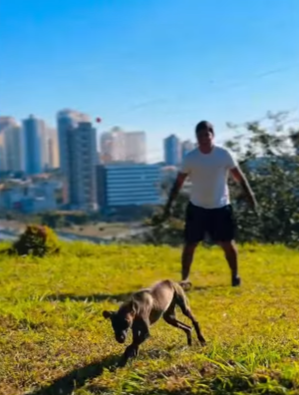
Even when he struggled or regressed, he never lost the ability to trust. And I never lost the willingness to support him, to lift him up when he couldn’t stand on his own, and to reassure him that he was never alone.
One evening, as he rested in my arms after a particularly challenging therapy session, he looked up at me with those same pleading eyes, but this time, there was a glimmer of understanding, a quiet acknowledgment of progress. He nudged my hand gently, as if to say, “I trust you. And I believe I will be okay.”
And in that moment, I realized that our journey was about more than recovery—it was about connection, resilience, and the profound impact of compassion. A paralyzed dog had asked the simplest yet most profound question: “Will I be okay?” And through love, patience, and trust, I had been able to answer it not with words alone, but with actions, until he could believe it in his heart.
That night, as he fell asleep in my arms, safe and warm, I whispered softly, “Yes, you’ll be okay. You’re going to be more than okay. You’re going to thrive.” And in the quiet rhythm of his breathing against mine, I felt the deep, undeniable truth: trust and love can heal even the most fragile of hearts, and sometimes, the smallest, most helpless creatures teach us the greatest lessons about hope.


